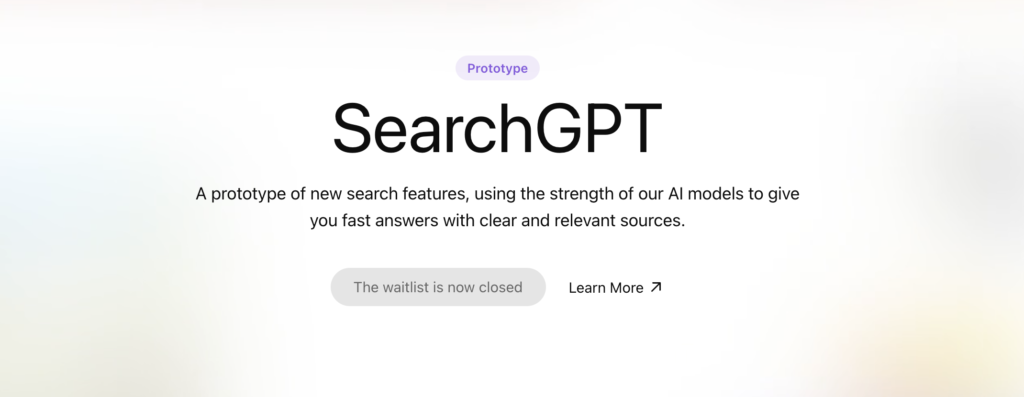Marketing tools are constantly evolving, and with the rise of AI, companies are facing new challenges. One such invention is SearchGPT, an idea that’s revolutionizing how businesses handle their whole digital strategy in addition to how we think about SEO. As businesses adapt to this AI-driven shift, many are asking: could SearchGPT disrupt the dominance of Google as the go-to search engine tool? This new technology has the potential to reshape how we navigate the online world, posing both opportunities and questions for the future of search.
What is SearchGPT?
The SearchGPT — search engine prototype was developed by OpenAI.
It offers a fresh approach to interacting with information online by fusing generative AI capabilities with conventional search engine functionality. SearchGPT seeks to deliver clear and concise responses to user questions in contrast to standard search engines, which often offer lists of relevant websites.
Thanks to this advancement in search technology, users may now get the information they need without having to trawl through several links and web pages. As an alternative, SearchGPT provides contextualized results that are meant to immediately fulfill the user’s search purpose. This means that, for companies and marketers, the focus of SEO strategies will shift to authoritative and high-quality content that satisfies the demands of AI-driven search engines.
Among SearchGPT’s primary attributes are:
- Natural Language Processing (NLP): It provides more human-like interactions by comprehending and answering questions in conversational language.
- Real-Time Content Generation: SearchGPT uses its training data to produce replies instantly, rather than presenting search results.
- User Intent Recognition: By examining the context and intent of a search, it accurately interprets complicated or ambiguous queries.
- Less Dependency on Links: Users don’t have to click on several links to receive immediate answers. SearchGPT features a search interface that includes a sidebar displaying relevant search results from various websites on the left, while the right side shows a generated, more structured response.
How to Use SearchGPT & Sign Up
SearchGPT’s waitlist is now closed, so there are no openings for new signups. On the other hand, you may remain up to date by keeping up with the developers’ updates. Once it’s available to the general public, SearchGPT should be reachable via ChatGPT integration or direct access, where you may use the AI-powered search tool. Watch for updates regarding availability in the future!

Effect of SearchGPT on SEO and Organic Search
Since its launch, SearchGPT has started to significantly disrupt both SEO strategies and organic search traffic. What does this mean?
- Reduced Dependency on Organic Search Rankings
This is completely a new shift. One of SearchGPT’s most notable effects is the decline in clicks from organic searches. When using AI-based models, users may not even need to go to other websites since the AI responds to their questions immediately. This may result in fewer organic search visitors for websites that significantly depend on high search engine rankings.
- Transition to High-Quality Content
Although keyword optimization may become less crucial, high-quality content is now more crucial than ever. As AI models work to deliver the most accurate and thorough answers to user inquiries, SearchGPT prioritizes information that is well-researched, educational, and contextually relevant.
- Changes to SEO Strategy
Link-building and keyword-focused SEO tactics are becoming less effective. Traditional on-page SEO tactics might not have as much of an impact on how the material is presented to visitors as they formerly did, as SearchGPT develops replies depending on the data it has been trained on.
- Effect on Long-Tail Keywords
AI search algorithms are also having an impact on long-tail keywords, which were formerly a mainstay of SEO strategy. Because SearchGPT can read multi-part or ambiguous searches well due to its knowledge of user intent, it may lessen the need for precise long-tail keyword targeting.
Studies are starting to demonstrate how AI-based search algorithms affect organic traffic. Companies are seeing an average reduction in organic search traffic of 20–60% as AI-driven search algorithms become more common.
- Increased Competition for Featured Snippets
SearchGPT’s reliance on highlighted snippets for a large portion of its material has increased competition for main source placement. These days, featured snippets — tiny summaries at the top of search results — are more important than ever since SearchGPT frequently utilizes them to provide direct answers to user inquiries.
For instance: “How to Boost Website Loading Speed?”
Consider a website that wants to appear in the highlighted snippet for the search term “How to boost website loading speed.” Websites fight for a top spot on the SERP in the conventional search results. As of right now, just the website supplying the snippet receives the most exposure because SearchGPT generates results straight from snippets. One possible result of SearchGPT is:
- Minify JavaScript and CSS.
- Enhance pictures
- Turn on the browser’s cache.
These responses come from the highlighted snippet, which gives the page that holds that position more exposure at the expense of other pages that are fighting for readers’ attention.
Why the Competition Has Intensified
- Higher Visibility: SearchGPT presents the snippet content as the main answer.
- Position Zero: Being in a featured snippet positions your content above all other results.
- Reduced Clicks: SearchGPT reduces the need for users to visit additional websites.
Ways to Adjust
- Make sure your information is neatly structured before choosing snippets.
- Give brief and simple responses.
- For easier reading, use lists and bullet points.
- Don’t forget about visuals.
Nowadays, getting a featured snippet is essential as it guarantees that your content will appear higher in AI-driven search results in addition to increasing conventional search exposure.
Difficulties for Experts in SEO
For SEO experts, the launch of SearchGPT poses specific difficulties. Because conventional ranking variables are losing their sway, SEO experts need to reconsider their approaches.
- Loss of Clicks: The largest obstacle could be the decline in organic clicks. SEO experts who used to concentrate on SERP rankings now have to deal with the possibility that visitors won’t click through to websites at all.
- Adapting to AI Algorithms: SEO tactics must now include more than simply keyword research. Unlike traditional search algorithms, AI models like GPT have a deeper understanding of language and context. SEO specialists need to provide content that is conversational, educational, and extremely engaging to satisfy the demands of AI-driven search engines.
- Unpredictability of AI Responses: Unpredictability of AI Responses: Even if two questions are the same, SearchGPT can provide unique responses for each one. This implies that the content displayed for a certain query may not be present for another. It is more difficult to guarantee steady website traffic because of this uncertainty.
- Difficulties with Keyword Optimization: Traditional keyword optimization has lost significance as SearchGPT becomes more competent at understanding context and user intent. SEO specialists now need to move beyond exact-match keywords. They should take into account the content’s larger context and purpose, ensuring content answers not only the current query but also the user’s potential follow-up questions.
- Technical SEO Challenges for Experts: AI readability depends on a well-structured page with suitable headers, clean HTML, and informative alt text and site performance is now a must. Website speed is a crucial SEO consideration since AI search engines give preference to pages that load quickly. To keep exposure in AI search results, SEO specialists must continuously check Core Web Vitals, optimize pictures, and speed up loading times. This will guarantee a smooth user experience and higher conversion rates.
Getting Used to the Changes
The emergence of SearchGPT and related AI technologies does not mean that SEO is going away; rather, it necessitates a dramatic change in strategy. Businesses and SEO experts must adjust by implementing new plans that put context and quality above conventional SEO techniques.
- Personalize Content: Producing highly tailored content will become more and more crucial as SearchGPT becomes more adept at interpreting user intent. Companies should concentrate on creating content that is suited to the unique requirements and inquiries of their target market.
- Consider the Changes in Link Building: As AI concentrates more on link quality than quantity, traditional link-building techniques are becoming less valuable. Because AI rewards excellent content, all articles have an opportunity to rank according to efficacy rather than just backlinks. With less emphasis on backlinks, brand mentions and social content will become more important. These elements will be more important in determining content ranking and selection as AI becomes more adept at identifying brand authority.
- Prioritize Topical Authority: Organizations should concentrate on establishing authority for complete subjects rather than optimizing for specific keywords. Developing in-depth content clusters that address a topic thoroughly might increase the likelihood of being cited by SearchGPT.
- Diversify Content Channels: Companies should consider expanding their digital marketing strategies in light of the possible decline in organic traffic. This might entail putting more emphasis on social media, paid advertising, or other outlets that are less impacted by search results produced by artificial intelligence, such as YouTube and podcasts.
- Use Visuals: To improve your content, using high-quality pictures, infographics, charts, and videos is essential. In addition to increasing user engagement, visuals also raise the likelihood of getting chosen for highlighted snippets since search engines prefer user-friendly material.
- Boost User Engagement: Click-through rates and dwell times are two important engagement metrics that will not go away. Providing engaging and meaningful material to visitors will enhance a website’s trustworthiness and performance, even in an AI-driven future.
- Create Rich Snippets and Structured Data: AI models make greater use of structured data to comprehend content. Enhancing your website for structured data and rich snippets can assist companies in staying visible in an AI-driven search landscape.
- Optimize for Voice Search: AI models such as GPT are directly related to voice search. Make your content voice search-friendly by emphasizing natural language processing and conversational questions.
- Track Advances in AI: Keep abreast of AI technology advancements and how they affect search engine optimization. AI’s impact on user behaviour and search engine results will change as it develops further.
What’s Next for SearchGPT?
The development team intends to keep improving SearchGPT, with a particular emphasis on local information and commerce. They plan to collect input from publishers and users to further improve the prototype. In the end, ChatGPT will include the best features from SearchGPT to provide a more smooth and enjoyable user experience.
Even though the future of SEO is unclear, two things are certain: in the age of artificial intelligence, successful digital marketing will still depend heavily on high-quality content and smart adaptability. So, next time you write SEO-optimized content, don’t forget about quality.




